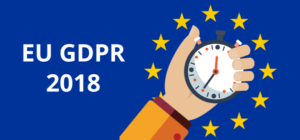The new law passed by the EU government, i.e., the General Data Protection Regulation commonly known as GDPR has transformed the way organisations are interacting with personal data, and therefore big data analytics. However more than that, it provides a chance for enterprises to transform the way they approach governance proficiencies.
Though the growing invention and complexity of cyber security threats have made compliance and security main priority for most organisations, the GDPR intensifies this attention. Under the GDPR, desecrations of record possession, security and breach notifications can cause a fine of 20 million Euros or 4% of the global revenue, whichever is higher. Companies are left with no choice but to focus and ensure that the compliance is followed.
Though, big data has been complicating the process of maintaining compliance for GDPR regulations and various other privacy rules. There is an incredible volume of data that is transformed into various intermediate forms, and used in various ways.
GDPR guidelines refer to all of the data that is accumulated throughout the big data analytics ecosystem, whether it is provided by clients or collected by automated systems. Every aspect of GDPR must be tracked, managed and reported.
4 Major Aspects of GDPR Compliance
In order to effectively govern private data and meet the GDPR compliance, a combination of people, process and tools are required. They are divided into four key aspects.
-
Discover
It is important to discover all features of the private data that is managed under GDPR compliance. This requires wide assessment of data assets to recognize if any rights have been given to use the data.
Governance does not play a substantial role at this stage, but big data discovery does. Your analysts will involve innovative, easy-to-use data discovery tools to evaluate the state of the data and determine where and when to apply authorizations. Perceptible lineage will also provide information with respect to the data, such as what was its source and how it was transformed.
-
Secure and Govern
As soon as personal data is compiled, categorised and fragmented, it can then be secured and governed. This will require applying different policies to the data in various stages and forms.
Securing and governing the data requires several critical competences applied as needed, including:
- Applying proper policies
- Comprehensive cataloguing
- Encryption and masking
- Flexible organisation methods
- Cover the entire information lifecycle
-
Monitor and Manage
Managing and monitoring the analytic pipelines involving private customer data can rapidly become complex. With customer data used in various ways (retention, up-sell, cross-sell, engagement and much more), the data and how it’s used can rapidly get scattered.

Meeting the terms of GDPR regulations necessitates proof that proper controls and processes are prepared to secure the private data and use it accurately in line with the consent of individuals. With an ever-increasing volume of data and growing analytics on the data, manual processes reporting GDPR compliance can become a huge resource drain on a taxed IT staff.
Smart organisations are combining information about GDPR processes in central warehouses, categorizing solutions or IT control systems. This abridges and streamlines the auditing and reporting processes for GDPR.
